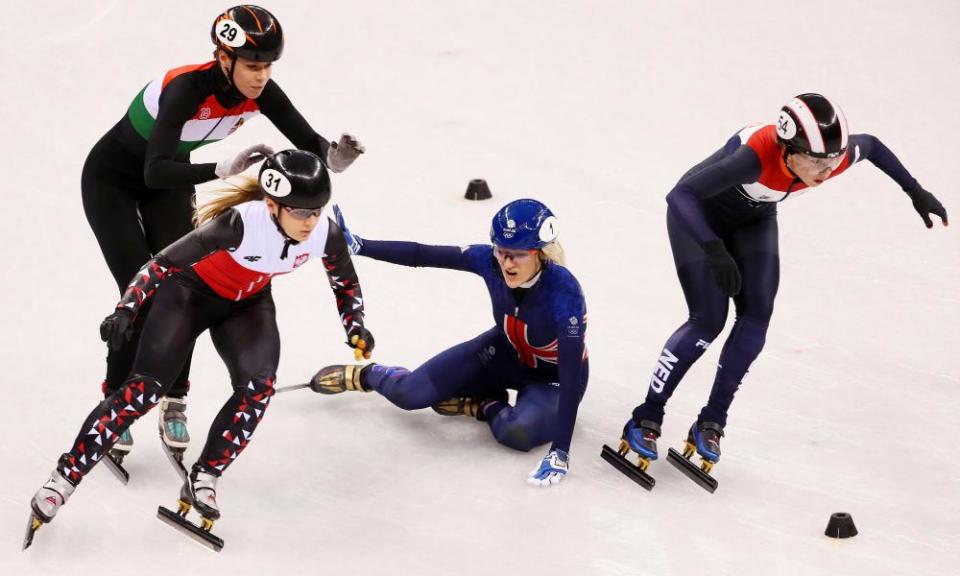Is Elise Christie Olympic nightmare down to bad luck or bad racing?

Each time Elise Christie has stepped on to the ice at these Winter Olympics, there has been a gnawing sense among those watching that they are about to become rubberneckers at the scene of a high-speed smash or witnesses to another painful tearjerker.
Part of that is the nature of short track speedskating, a wildly exciting but devilish sport that requires competitors to ping around a 111m oval track at speeds of more than 20mph, while avoiding opponents swarming and jetting around them. Of course there will be crashes, and plenty of them. It is the nature of the beast.
Yet, increasingly, it is only fair to also ask how much of Christie’s bad luck is down to her rather than her sport. Sure, one or two slices of misfortune is natural. But a run of six successive crashes or disqualifications at a Winter Olympics dating back to Sochi four years ago is harder to explain way.
Was it the increased pressure of being at the biggest event in your sport, she was asked. “No,” she responded, before pointing out she felt more nervous before winning three titles in last year’s world championships in Rotterdam. “I just see it as three races that went rubbish in the last four years. Unfortunately all three of them were here. That’s short track and that’s the way it goes sometimes.”
There is some truth to that. In eight women’s 1,000m heats at Gangneung Ice Arena on Tuesday, six skaters were disqualified for infringements while another five suffered a similar fate in the men’s 500m heats.
Was she too aggressive when she raced? This time GB’s short track leader, Stewart Laing, shook his head. “It’s harsh if people call Elise reckless,” he said. “It’s the nature of racing.”
Perhaps. But after rewatching all of Christie’s races in Sochi and Pyeongchang there is a case to be made that her all-or-nothing approach narrows the margins between glory and disaster by too great a margin. Hers is a muscular style, an eye-of-the-needle approach, a gold-or-bust attitude.
UK Sport, the funding body for Olympic events, have long espoused a “no compromise” philosophy. The 27-year-old has a similar mindset. Even now, Christie has not contemplated, at least publicly, whether she should change that approach. The closest she came, after being disqualified on Tuesday was to suggest that she would get even stronger so she could charge out into the lead in all her races and not have to worry so much about swooping in from behind. But maybe it would not have been so bad to have claimed bronze in the 500m last week, rather than make too daring a move and crash out.
Meanwhile what happens next when UK Sport comes to allocating funding for the next Winter Olympics in Beijing will be fascinating. For the current cycle it gave short track £4.76m in funding, and in exchange agreed a target of between one and two medals for these Games. Clearly the sport has come up short.
Yet it is worth pointing out that before the Winter Olympics, Chelsea Warr, UK Sport’s venerable director of performance, made it clear that sports such as short track speedskating were part of a “theatre of jeopardy” with higher potential rewards but also greater risks of failure than their summer counterparts.
That is right and it should ease some of the programme’s fears. Yet Christie apart, there does not appear to be a deep network of British short track talent ready to burst through. In Pyeongchang it became a familiar sight to seen Team GB athletes bundled out in the heats. “We’ll go back and have a thorough review,” said Laing afterwards.
Meanwhile Christie, for all her brilliant talent and engaging personality, will have to learn some lessons too.

 Yahoo Sport
Yahoo Sport 





































